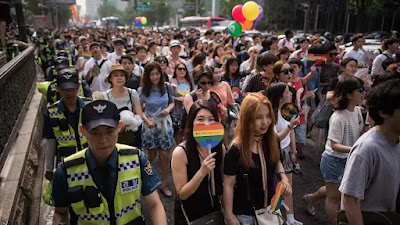The pride festival was celebrated by thousands of gay rights supporters who marched under mass police presence for the first time in three years after COVID-19 forced an extended hiatus of large events.
Participants, some wearing rainbow masks and toting rainbow flags, looked around some 72 booths opened by human rights groups, university LGBTQ clubs, embassies, religious and progressive organisations, taking part in face painting or social media events.
Counter-protesters and conservative Christian groups rallied in nearby streets as well, holding banners and posters that attacked acts of homosexuality and queer relationships.
Organisers of the Pride festival required photojournalists to take photographs of event attendees from the “farthest possible distance” as well as obtaining consent of all individuals whose faces would be recognisable in images, a standard which is used as a preventative measure to protect festivalgoers from potential backlash or homophobic attacks if their images are found circulating the Internet.
While there has been strides made to bolster support for sexual minorities and the queer community in South Korea, LGBTQ centered discussions are still considered taboo and often subject to hate speech and crimes. The influence of Christian lobbying groups have impacted public opinion and prevented politicians from passing anti-discrimination laws.


No comments:
Post a Comment